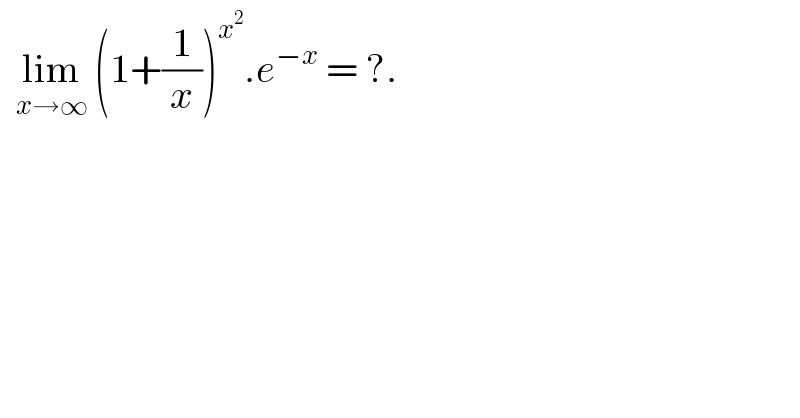
Question and Answers Forum
Question Number 118950 by benjo_mathlover last updated on 21/Oct/20

Answered by john santu last updated on 21/Oct/20
![L = lim_(x→∞) (((1+(1/x))^x^2 )/e^x ) ln L= lim_(x→∞) ln ((((1+(1/x))^x^2 )/e^x )) ln L = lim_(x→∞) x^2 (ln (1+(1/x))−x) [ by using Maclaurin series ] ln L = lim_(x→∞) x^2 ((1/x)−(1/(2x^2 ))+(1/(3x^3 ))−O(x^3 ))−x) ln L = lim_(x→∞) [x−(1/(2x))+(1/(3x^2 ))−O(x^2 )−x ] ln L = lim_(x→∞) (−(1/2)+(1/(3x^2 ))−O(x^2 ))=−(1/2) L = e^(−(1/2)) = (1/( (√e))) .](Q118953.png)
| ||
Question and Answers Forum | ||
Question Number 118950 by benjo_mathlover last updated on 21/Oct/20 | ||
 | ||
Answered by john santu last updated on 21/Oct/20 | ||
![L = lim_(x→∞) (((1+(1/x))^x^2 )/e^x ) ln L= lim_(x→∞) ln ((((1+(1/x))^x^2 )/e^x )) ln L = lim_(x→∞) x^2 (ln (1+(1/x))−x) [ by using Maclaurin series ] ln L = lim_(x→∞) x^2 ((1/x)−(1/(2x^2 ))+(1/(3x^3 ))−O(x^3 ))−x) ln L = lim_(x→∞) [x−(1/(2x))+(1/(3x^2 ))−O(x^2 )−x ] ln L = lim_(x→∞) (−(1/2)+(1/(3x^2 ))−O(x^2 ))=−(1/2) L = e^(−(1/2)) = (1/( (√e))) .](Q118953.png) | ||
| ||